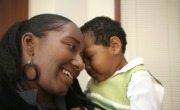Growing up and leaving care can be difficult without many of the family and friend networks many of us take for granted. Here, care expereienced adult, Rebecca shares how her own life experience was invaluable when mentoring young people who have experienced trauma with our London Friendship Works service.
Early experiences
The thing about early experience is that it stays with you somehow – whether it’s negative or positive.
That’s what I was reflecting on when I thought about taking up mentoring as, although things were objectively better than they’d ever been for me, I also thought about the connections I’d made and how they’d helped shape my life experiences.
I had a challenging childhood, where I had some experience of time in care
I had a challenging childhood, where I had some experience of time in care, but I loved music.
I think I loved the radio most of all as, growing up in a turbulent house, going in and listening to the radio was a form of respite.
It was another world to be in. There wasn’t the internet in those days so you couldn’t get lost online at that time, but this was a way to get lost in something and I expressed that love by going to gigs and playing an instrument.
That was where I found my mentor at around the age of 13 or 14, but not in the formal sense.
She was my guitar teacher and was probably only in her early twenties but seemed sorted, and that was transformational for me in some way.
I’d had quite a significant issue occur in my family at the time and she was there for me.
It was the first time I’d been friends with an older person and, through that friendship, something else happened – I saw a different vision of how people could be.
I didn’t respond at the time or even take it in that much but as I got to her age and beyond, the things she said stayed with me.
Important friendships
Even so, I left home predictably young, and I was soon fending for myself.
I had a job in a café, and I thought it was amazing. I felt part of something, and I thought I’d made it.
Again, however, I was very lucky with the mentors in my life.
At that time, I was 17-18 and my friends were older – they were training at university.
They convinced me I shouldn’t work in a café forever, and talked to me about going to university, and finding funding, and moving to a different area where I could indulge my love of music.
Which is how I ended up promoting gigs in East London, and eventually moving into the music industry full time.
I still wonder whether, if those friendships hadn’t come along, would I have been so confident and interested in exploring that avenue?
Which brings me back to that day I resolved to find a mentoring scheme.
Applying to be a Friendship Works Mentor
I don’t have kids, but I have friends with kids, and I think something starts to happen as you get older where you compare yourself and your desire to connect to others.
I always thought that I’d adopt, or I’d foster but, because of the way I was brought up, that instinct never came up.
One day I was reflecting on the points where I could have done with a mentor to support me as a young person.
One day I was reflecting on the points where I could have done with a mentor to support me as a young person.
Because I had a challenging background and care experience, I thought that was another dimension which might help me relate to someone trying to find a place in the world.
So I applied for Family Action’s Friendship Works mentoring scheme.
The people who interviewed me were incredibly skilled, and there was some investigation into why I wanted to do it… It was really rigorous.
I understood, as how else do you protect these young people?
The process helped me to look at my own motivations and own them, and I felt I got some great feedback.
I was told I was really resilient, that I had developed these great ways of coping, and that I was a really “safe” person, which was such a nice thing to say, and gave me a lot of confidence.
They also explained how they would take great care to ensure I was safe and wouldn’t be put with young people who might be experiencing similar challenges to the ones I had.
I then waited another four or five months to be paired with someone. Maybe it was less than that – time was funny then as it was just after COVID.
The perfect fit
The matching process was kind of amazing.
I’m quite laid back, but I feel like I’m too laid back, if that makes sense, and I worried I couldn’t keep up with someone who was always on the go.
But I was told the individual experienced anxiety and wanted to hang out with someone who’s very calm.
It sounded like he was the perfect fit as it said he liked going to woods and taking photos… I’m a Buddhist and I thought “that sounds like a mindfulness practice”!
I was so excited to meet him.
It became real at that point, as up until then it had been about me and my motivations… It was all very abstract, and then you realise “this is going to be an actual relationship”.
After meetings with our caseworker – who was immensely good at her job – we finally met in a cafe.
It was really quiet, and he was very nervous.
I’m not sure if I was… I just wanted to have things to say, but it was a very gentle process, and I liked this 18-year-old right away.
It’s funny… beforehand you have these ideas for big trips out – “let’s go to an art gallery” – but none of that’s been important in the time we’ve known each other.
We run errands that he needs to run; go look in shops… That sort of thing.
He mocks me for going in charity shops and tells me that I’m “such a millennial” and I think “charity shop style… that’s so old. I’m so old”
I’ll make jokes and he’ll say “you think you’re funny” and I’ll be like “people DO tell me I’m funny”.
But despite that surface level stuff it’s important.
He’ll ask me how long it took to get to him, and he’ll be impressed that it took 70 minutes, but I’m happy to do it – I get the impression it’s almost like me showing that he’s worth turning up for.
And I know that he does listen.
He has his own challenges based on his environment and, reading between the lines, I know he’s had to make some difficult decisions, but he’s told me that when he did so he thought of me and what I’d say… I’m proud that when he’s in a tricky situation he’s able to say “I know someone who wouldn’t be ok with this”.
But I also think of him a lot.
There’s an introspectiveness to him and an ability to articulate his feelings that we’ve got in common, and it’s been so rewarding getting to know him.
Find out more about mentoring a child or a care leaver in London with Friendship Works.







